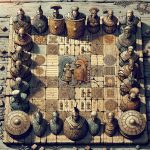Ancient Strategy Board Games have been a source of entertainment and intellectual challenge for people across various cultures for centuries. These games, with their roots dating back to ancient civilizations, have not only provided leisure but also served as a means of strategic thinking and social interaction. From Mesopotamia to China, these games have stood the test of time and continue to fascinate enthusiasts around the world.
The origins of ancient strategy board games can be traced back to early human civilizations, with evidence of some games dating back over 3,000 years. These games were not only played for amusement but also had symbolic and ritualistic significance in many cultures. As such, they offer a window into the beliefs, values, and social structures of ancient societies.
Types of ancient strategy board games vary from culture to culture, with each game offering unique challenges and strategies. Some popular examples include Senet from Ancient Egypt, Go from China, and Mancala from Africa. The rules and objectives of these games differed but they all shared the common purpose of providing intellectual stimulation and entertainment.
The Origins of Ancient Strategy Board Games
The history of ancient strategy board games can be traced back to thousands of years ago, with evidence of their existence found in various regions of the world. These games were not only a form of entertainment but also served as a tool for teaching strategic thinking, planning, and decision-making.
One of the earliest known ancient strategy board games is Senet, which was played in ancient Egypt around 3100 BC. The game was found in the tomb of Merknera, believed to be one of the oldest board games ever discovered. Another well-known ancient strategy game is the Royal Game of Ur, which originated in Mesopotamia around 2600 BC and was popular throughout the ancient Near East.
In China, a game called Go has been played for over 2,500 years and is considered one of the most complex ancient strategy board games. In India, the game of Chaupar dates back to at least 300 AD and was often associated with religious beliefs. These early examples show that ancient strategy board games were an integral part of many ancient civilizations, reflecting their cultural values and societal norms.
According to archaeological findings and historical records, these ancient strategy board games were not only recreational activities but also had ritualistic and symbolic significance in many cultures. For example, some games were believed to represent cosmic principles or spiritual concepts, while others were used as divination tools or for military training purposes. The enduring legacy of these games reflects their enduring appeal and importance in human history.
| Ancient Strategy Board Game | Origin |
|---|---|
| Senet | Ancient Egypt (around 3100 BC) |
| Royal Game of Ur | Mesopotamia (around 2600 BC) |
| Go | China (over 2,500 years ago) |
| Chaupar |
Types of Ancient Strategy Board Games
Ancient Strategy Board Games come in a variety of types, each with its own unique rules, playing pieces, and cultural significance. These games provided entertainment and intellectual stimulation for ancient civilizations, and many are still played today.
Some of the most popular types of Ancient Strategy Board Games include:
–
- Chess: Originating in India over 1500 years ago, chess is a two-player game that requires strategic thinking and foresight.
- Go: Dating back to ancient China, Go is a game of territorial control and encircling opponents’ pieces.
- Mancala: This family of games has been played across Africa and Asia for centuries, involving the capture of opponents’ pieces through strategic moves.
These games were not only sources of entertainment but also held cultural significance in their respective societies. They were often used to teach important societal values, military strategy, or even religious concepts. The types of Ancient Strategy Board Games reflect the diverse cultures in which they originated.
As these games spread across different civilizations, they evolved to suit the tastes and preferences of each society. Some variations adopted new rules or added different playing pieces to accommodate regional customs and traditions. Despite these adaptations, the core elements of strategy and skill remained constant throughout their history.
Today, many enthusiasts continue to seek out and play these fascinating ancient games, not only as a way to connect with history but also to challenge themselves intellectually. The timeless appeal and enduring legacy of Ancient Strategy Board Games ensure that they will remain an integral part of human culture for generations to come.
How Ancient Strategy Board Games Were Played
The ancient world was home to a wide variety of strategy board games that were played using different rules, boards, and pieces. These games were not mere sources of entertainment, but also served as tools for teaching strategy, decision making, and critical thinking. Here are some examples of how ancient strategy board games were played:
1. Senet: This game originated in ancient Egypt and was often played on a board consisting of three rows of ten squares each. The game pieces were moved according to the throw of sticks or bones, and the objective was to move all the pieces off the board.
2. Go: Dating back over 2,500 years to ancient China, Go is one of the oldest known strategy board games still being played today. The game is played on a grid with black and white stones, with players taking turns to surround their opponent’s pieces.
3. Mancala: This game has many variations and is popular across Africa and parts of Asia. It involves capturing an opponent’s pieces by sowing seeds or stones around the board.
Playing these ancient strategy board games required a deep understanding of tactics, forward planning, and adaptability. Many of these games also had symbolic or religious significance within their cultures, further enriching the experience for players.
Ancient strategy board games offer a window into the past and provide insight into the way people lived and thought in different cultures throughout history. These games continue to inspire curiosity and fascination among historians as well as modern enthusiasts who appreciate their enduring appeal.
Cultural Significance of Ancient Strategy Board Games
Ancient strategy board games hold a significant cultural importance in many societies throughout history. These games were more than just a form of entertainment; they often held deep symbolic and spiritual meaning for ancient civilizations. In fact, in some cultures, the outcome of these games was believed to have mystical implications, influencing decisions related to war, marriage, or even matters of life and death.
One example of the cultural significance of ancient strategy board games is the game of Senet, which was popular in ancient Egypt. This game was intricately tied to their belief in the afterlife, as it was often included in burial goods to accompany the deceased into the next world. The game’s symbolism reflected the journey of the soul through the afterlife and its successful completion was seen as crucial for a favorable outcome in the divine judgment.
Similarly, in ancient India, the game of Chaturanga (a precursor to chess) held great cultural significance. It was not only a game of skill and strategy but also represented the battlefield with its four elements – infantry, cavalry, elephants, and chariots – reflecting aspects of warfare deeply rooted in Indian culture.
These examples illustrate that ancient strategy board games were deeply ingrained in the social fabric of various cultures around the world. They were not simply pastimes; they held spiritual and symbolic meaning that reflected core beliefs and values within these societies.
| Ancient Strategy Board Game | Cultural Significance |
|---|---|
| Senet (Egypt) | Representation of journey through afterlife; included in burial goods |
| Chaturanga (India) | Reflection of elements on battlefield; representation of warfare values |
The Evolution of Ancient Strategy Board Games
Ancient strategy board games have a long and impressive history that continues to captivate people all over the world. The evolution of these games has been shaped by various cultural influences, technological advancements, and societal changes. Understanding how ancient strategy board games have evolved can provide valuable insights into their enduring appeal and significance.
Early Origins
The origins of ancient strategy board games can be traced back thousands of years to different civilizations around the world. Some of the earliest known board games, such as Senet in ancient Egypt, Go in China, and Chess in India, date back to as early as 3000 BCE. These games were not only sources of entertainment but also had symbolic and religious significance within their respective cultures.
Influence of Technology
As societies progressed and technological advancements were made, ancient strategy board games also underwent changes. With the invention of printing press in the 15th century, board game designs became more standardized and widely distributed. The industrial revolution further popularized board games with mass production, making them more accessible to people across different social classes.
Cultural Adaptation
Throughout history, ancient strategy board games have been adapted to reflect changing cultural values and societal norms. For example, the Japanese game Shogi was developed from its Indian predecessor Chess but incorporated unique elements that are distinct to Japanese culture. Similarly, Mancala games evolved differently in Africa based on regional customs and traditions.
Understanding the evolution of ancient strategy board games provides valuable insights into their enduring appeal and cultural significance. The interplay between early origins, technological influence, and cultural adaptations has contributed to the rich diversity of these timeless games that continue to be enjoyed by people around the world today.
Notable Ancient Strategy Board Games From Different Cultures
Ancient Egypt: Senet
One of the most well-known ancient strategy board games from Egypt is Senet. This game dates back to around 3100 BC and was played on a board with 30 squares arranged in three rows of ten.
The game was associated with the afterlife, and it was believed that the winner would be favored by the gods. The exact rules of Senet are not entirely clear, but it is believed to have involved strategy and luck, making it a popular pastime for the ancient Egyptians.
Ancient China: Go
Go is an ancient Chinese board game that has been played for over 2,500 years. It is a game of perfect information, meaning that there are no hidden elements or chance events.
Go is known for its simple rules but complex strategy and has been compared to chess in terms of its depth and complexity. The game involves capturing territory by surrounding empty spaces and was considered one of the four essential arts of a cultured Chinese scholar in antiquity.
Ancient India: Chaturanga
Chaturanga is an ancient Indian strategy board game that is considered the ancestor of modern-day chess. The game dates back to at least the 6th century AD and shares some similarities with chess, such as pieces representing different types of military units and the objective being to capture the opponent’s king. Chaturanga was a popular pastime among Indian nobility and was even mentioned in ancient Indian epic poetry.
These notable ancient strategy board games from different cultures offer insight into the diverse ways in which ancient societies entertained themselves while also exercising their strategic thinking skills. Each game reflects unique cultural values and traditions while also showcasing the universal appeal of strategy-based entertainment throughout history.
Modern Day Revival of Ancient Strategy Board Games
The resurgence of interest in ancient strategy board games has been a notable trend in recent years. While many modern games and electronic forms of entertainment exist, there is something timeless and appealing about the simplicity and challenge of these ancient games. Whether it’s the tactile nature of moving game pieces on a board or the intellectual stimulation of strategic gameplay, people from all walks of life are rediscovering the joy of these traditional pastimes.
One factor contributing to the revival of ancient strategy board games is their historical significance. Many of these games have been played for centuries, with origins dating back to ancient civilizations such as Egypt, Mesopotamia, and China.
The deep roots and cultural heritage associated with these games add an element of fascination for enthusiasts seeking a connection to the past. As a result, there has been a growing interest in learning about the historical context and evolution of these games, further fueling their resurgence.
In addition to their historical appeal, modern society’s focus on unplugging and reconnecting with analog experiences has also led to a renewed interest in ancient strategy board games. In a world dominated by digital screens and fast-paced technology, playing a game that requires patience, strategy, and face-to-face interaction can be refreshing.
Many people are finding that playing these ancient games provides a welcome break from the hustle and bustle of everyday life. As individuals seek balance and mindfulness in their leisure activities, they are increasingly drawn to the timeless charm of ancient strategy board games as a means of relaxation and mental stimulation.
Tips for Finding and Playing Ancient Strategy Board Games Today
In today’s modern world, ancient strategy board games continue to captivate the interest of enthusiasts looking for a break from digital entertainment. If you are interested in discovering and playing these timeless games, there are several tips for finding and enjoying them today.
To start your journey into the world of ancient strategy board games, consider visiting specialty game shops or online retailers that cater to traditional and historical games. These establishments often carry a wide selection of ancient strategy board games from different cultures, allowing you to explore various gaming traditions and techniques.
Another way to find and play ancient strategy board games is by attending game fairs, conventions, or cultural events that showcase traditional gaming practices. These gatherings provide an opportunity to learn about the history and significance of these games while also connecting with fellow enthusiasts who share your passion for ancient strategy board games.
If you are unable to find physical copies of ancient strategy board games, consider exploring online platforms and forums dedicated to historical gaming. Many enthusiasts and collectors share resources, instructions, and even virtual adaptations of these games, allowing you to experience the thrill of playing ancient strategy board games regardless of geographical constraints.
By tapping into these online communities, you can expand your knowledge and appreciation for these timeless pastimes while connecting with like-minded individuals who share your interest in ancient strategy board games.
Conclusion
In conclusion, the enduring appeal of ancient strategy board games can be attributed to their rich history, cultural significance, and timeless gameplay. These games have stood the test of time, surviving centuries and still capturing the interest of people around the world. The origins of ancient strategy board games can be traced back to various civilizations, each contributing unique elements to the development and evolution of these games.
Furthermore, the cultural significance of ancient strategy board games cannot be understated. They served as more than just entertainment, often representing aspects of a society’s values, beliefs, and military tactics. As a result, these games offer an invaluable glimpse into the daily lives and thought processes of ancient civilizations.
The modern-day revival of ancient strategy board games also speaks to their enduring appeal. With the growing interest in historical recreation and traditional pastimes, more people are rediscovering and enjoying these classic games. From chess to Senet to Go, ancient strategy board games continue to captivate players of all ages with their blend of skill, intuition, and strategic thinking. Their ability to transcend time and culture makes them a true testament to the universality of human intellect and creativity.
Frequently Asked Questions
What Is the Oldest Strategy Board Game?
The oldest strategy board game is believed to be “Senet,” which originated in ancient Egypt around 3100 BC. It was a two-player game that involved strategy and luck, and it was often played for religious or symbolic purposes.
What Is the Ancient Greek Strategy Board Game?
The ancient Greek strategy board game is known as “Petteia” or “Polis.” It was a popular game in ancient Greece and is often compared to chess due to its strategic nature. The rules of the game have been largely lost to history, but it was widely played in its time.
What Is the Most Famous Strategy Board Game?
The most famous strategy board game is undoubtedly “Chess.” Originating in India during the Gupta Empire, it has become a global phenomenon and is beloved for its intricate strategies and competitive gameplay. Chess remains one of the most popular board games worldwide, with millions of players of all ages.

I love playing all kinds of games – from classics like Monopoly to modern favourites like Ticket to Ride.
I created this blog as a way to share my love of board games with others, and provide information on the latest releases and news in the industry.





